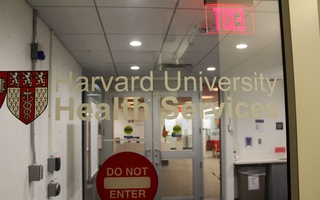The first Black Health Matters conference kicked off in Cambridge this weekend with panels and workshops focused on health disparities in the black community.
Saturday’s lectures and panels highlighted statistical differences in health outcomes between black and white Americans, while Sunday’s open workshops featured presenters exploring options for affecting change. Tania N. Fabo ’18 and Sarah B. Gutema ’19 organized the conference, which took place at Northwest Labs.
Fabo said she decided to organize the conference because she wanted to create a space for people to discuss solutions to health disparities.
“When we came up with the idea for the event we didn’t want people coming and learning and leaving with nothing,” Fabo said. “You leave with these frustrations but you don’t have a mechanism to put these frustrations into action.”
Fabo said the idea of the conference came after taking classes focused on medical ethics and health disparities. The event drew attendees with similar interests.
“I am interested in racial inequalities, especially health disparities, between people of color and whites in America,” conference attendee Christie A. Jackson ’21 said.
The conference opened Friday night with a screening of “Unnatural Causes: When the Bough Breaks,” a documentary about high infant mortality rates in black community.
Although originally intended for Harvard students, a mixed audience of working professionals, students from surrounding universities, and concerned Cambridge residents attended the conference.
Yvonne A. Wingard, a sophomore from Brown University, said she appreciated the conference’s efforts to empower those attending. Wingard said she originally felt helpless in the face of health issues in the black community, but the conference made her realize that even as a student she could do something substantive to address those issues.
“You can get frustrated about certain issues that happen but you think ‘I can’t do anything about it’ but this got me thinking,” Wingard said, “I can of course definitely talk with professors and staff members, but you can also reach out to the community itself.”
Another key aspect of the conference, Fabo said, was to unite researchers and members of the black community.
“I think that a lot of times there are conferences where there is this idea of separation where you have all these elites talking about issues without really talking to the community members that are affected by them,” Fabo said.
At the end of the weekend, attendees said they felt they left the conference with a greater understanding of the complexities behind health issues in the black community.
“Coming to this conference... exposed me to so many other forms of public health and so many other ways people can get involved. It doesn’t have to just be science and research,” Wingard said.
Read more in News
Petition for Race and Ethnicity Research Center Draws SupportRecommended Articles
-
 HUHS Switch Means Higher Healthcare Costs For Some
HUHS Switch Means Higher Healthcare Costs For Some -
 HUHS to Offer Remote Counseling Services Through iHope
HUHS to Offer Remote Counseling Services Through iHope -
 Khurana Praises, Defends Diversity Task Force Report
Khurana Praises, Defends Diversity Task Force Report -
'Okay to be White' Stickers Crop Up at Harvard, Around CountryMore than a dozen handmade stickers reading “It’s okay to be white” surfaced around Harvard Square Wednesday, prompting a Harvard Law School Dean to denounce them.













